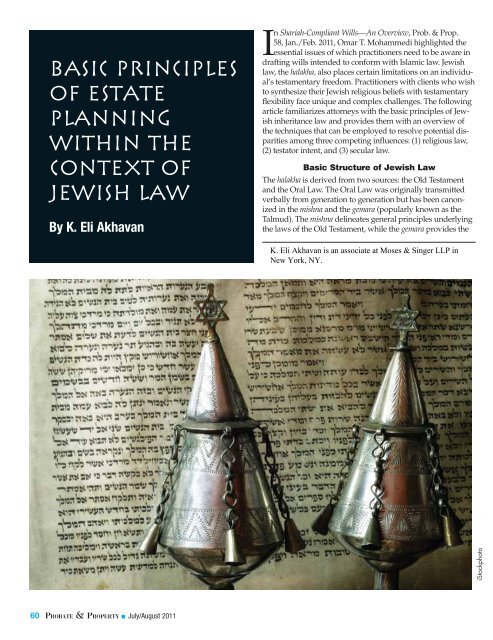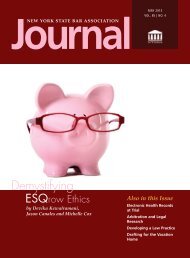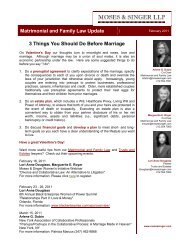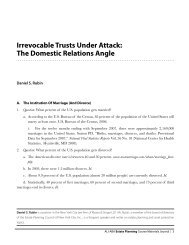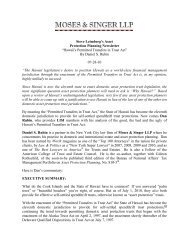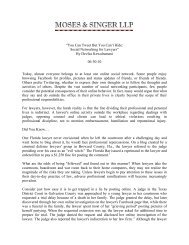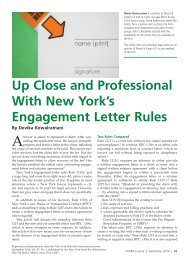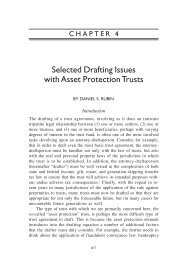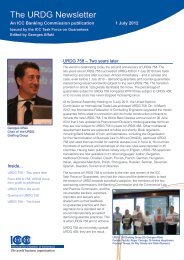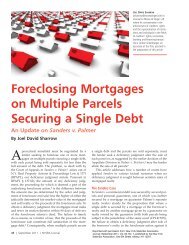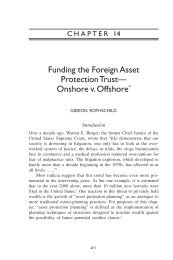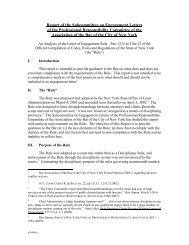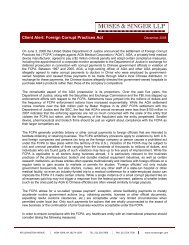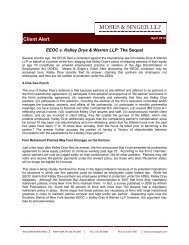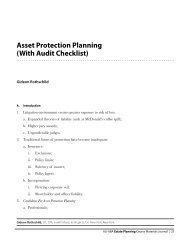Basic Principles of Estate Planning Within the Context of Jewish Law
Basic Principles of Estate Planning Within the Context of Jewish Law
Basic Principles of Estate Planning Within the Context of Jewish Law
- No tags were found...
Create successful ePaper yourself
Turn your PDF publications into a flip-book with our unique Google optimized e-Paper software.
<strong>Basic</strong> <strong>Principles</strong><strong>of</strong> <strong>Estate</strong><strong>Planning</strong><strong>Within</strong> <strong>the</strong><strong>Context</strong> <strong>of</strong><strong>Jewish</strong> <strong>Law</strong>By K. Eli AkhavanIn Shariah-Compliant Wills—An Overview, Prob. & Prop.58, Jan./Feb. 2011, Omar T. Mohammedi highlighted <strong>the</strong>essential issues <strong>of</strong> which practitioners need to be aware indrafting wills intended to conform with Islamic law. <strong>Jewish</strong>law, <strong>the</strong> halakha, also places certain limitations on an individual’stestamentary freedom. Practitioners with clients who wishto syn<strong>the</strong>size <strong>the</strong>ir <strong>Jewish</strong> religious beliefs with testamentaryflexibility face unique and complex challenges. The followingarticle familiarizes attorneys with <strong>the</strong> basic principles <strong>of</strong> <strong>Jewish</strong>inheritance law and provides <strong>the</strong>m with an overview <strong>of</strong><strong>the</strong> techniques that can be employed to resolve potential disparitiesamong three competing influences: (1) religious law,(2) testator intent, and (3) secular law.<strong>Basic</strong> Structure <strong>of</strong> <strong>Jewish</strong> <strong>Law</strong>The halakha is derived from two sources: <strong>the</strong> Old Testamentand <strong>the</strong> Oral <strong>Law</strong>. The Oral <strong>Law</strong> was originally transmittedverbally from generation to generation but has been canonizedin <strong>the</strong> mishna and <strong>the</strong> gemara (popularly known as <strong>the</strong>Talmud). The mishna delineates general principles underlying<strong>the</strong> laws <strong>of</strong> <strong>the</strong> Old Testament, while <strong>the</strong> gemara provides <strong>the</strong>iStockphoto60 n July/August 2011
details and analytical framework <strong>of</strong> thosegeneral principles through debate anddiscussion. <strong>Jewish</strong> rabbinic scholars haveprovided <strong>the</strong> codification <strong>of</strong> <strong>the</strong>se rulesover <strong>the</strong> course <strong>of</strong> many centuries. The <strong>Jewish</strong>legal system provides <strong>the</strong> flexibility for<strong>the</strong> modern-day application <strong>of</strong> halakha, andestate planning in <strong>the</strong> current legal and taxclimate is no exception.<strong>Law</strong>s and RegulationsGoverning InheritanceThe rules governing <strong>Jewish</strong> inheritancelaws are found in <strong>the</strong> Book <strong>of</strong> Numbers27:8–11 and <strong>the</strong> Book <strong>of</strong> Deuteronomy21:17. Under halakha, a decedent’s propertytransfers automatically to certain beneficiaries,even without a will. In fact, <strong>the</strong> halakhadoes not allow for <strong>the</strong> transfer <strong>of</strong> propertyto persons o<strong>the</strong>r than those enumeratedby <strong>Jewish</strong> law. In o<strong>the</strong>r words, a will thatdesignates beneficiaries o<strong>the</strong>r than thoseallowed by <strong>Jewish</strong> law is invalid for <strong>the</strong>purposes <strong>of</strong> halakha.Beneficiaries inherit under <strong>the</strong> halakhabased on a system <strong>of</strong> different levels <strong>of</strong>priority. A person <strong>of</strong> a first order <strong>of</strong> prioritywho survives <strong>the</strong> decedent inherits <strong>the</strong>decedent’s entire estate. If no member <strong>of</strong><strong>the</strong> first order <strong>of</strong> priority is alive at <strong>the</strong> time<strong>of</strong> <strong>the</strong> decedent’s death, <strong>the</strong>n <strong>the</strong> linealdescendants <strong>of</strong> that person inherit that person’sshare on a per stirpes basis. If nei<strong>the</strong>r<strong>the</strong> first order <strong>of</strong> priority person nor hisdescendants survive <strong>the</strong> decedent, <strong>the</strong>n <strong>the</strong>estate passes on to <strong>the</strong> next level <strong>of</strong> priority.The order is as follows:1. Son (<strong>the</strong> eldest son receives a doubleportion, under a version <strong>of</strong> primogenitureinheritance),2. Daughter,3. Decedent’s fa<strong>the</strong>r,4. Paternal bro<strong>the</strong>rs,5. Paternal sisters,6. Paternal grandfa<strong>the</strong>r,7. Paternal uncles,8. Paternal aunts, and9. Paternal great-grandfa<strong>the</strong>r.This order <strong>of</strong> priority continues for eachprevious generation.A decedent’s wife does not have a share<strong>of</strong> inheritance in her husband’s estate.Instead, an individual’s wife is entitled(1) to receive <strong>the</strong> pre-fixed amount asprovided for in her antenuptial agreement(<strong>the</strong> ketubah) or (2) to be supported from<strong>the</strong> decedent’s estate until she remarries.Fur<strong>the</strong>rmore, although daughtersare not beneficiaries if <strong>the</strong> decedentis survived by sons, daughters areentitled to payments for <strong>the</strong>ir weddingexpenses, and <strong>the</strong> estate is obligated topay minor daughters certain levels <strong>of</strong>support. If someone who is not entitledunder <strong>Jewish</strong> law takes possession <strong>of</strong><strong>the</strong> decedent’s property (for example,A testator whowishes to bequeathhis estate while notcompromising hisobservance <strong>of</strong> halakhamay confrontcertain hurdles.through estate litigation in surrogate’scourt), <strong>the</strong> halakha deems such a personas stealing from <strong>the</strong> estate.The halakha has fairly complex rulesfor property owned by a woman beforeand after marriage, which are beyond<strong>the</strong> scope <strong>of</strong> this article. Accordingly,unless o<strong>the</strong>rwise noted, <strong>the</strong> followingdiscussion assumes that <strong>the</strong> testator is<strong>the</strong> husband and not <strong>the</strong> wife.Potential Issues in Complyingwith HalakhaA testator who wishes to bequeath hisestate while not compromising his observance<strong>of</strong> halakha may confront certainhurdles. For example, if a married individualhas a wife, a son, and a daughter,and he bequeaths his entire estate to hiswife or to his daughter, he would beviolating halakha. Alternatively, a marriedindividual with a son and daughtermay not want to bequeath his entireestate to his son without providing forhis daughter and also may not want hiswife to be solely reliant on <strong>the</strong> antenuptialketubah agreement or paymentsfrom his estate. Even if an individualdies intestate, <strong>the</strong> local jurisdiction willin all likelihood distribute his assets in amanner not consistent with halakha, andthis may not be in conformity with <strong>the</strong>decedent’s intent.<strong>Estate</strong> <strong>Planning</strong> Techniques inCompliance with HalakhaThe following are four techniques thatallow a testator to comply with halakhaand yet maintain some level <strong>of</strong> testamentaryflexibility: (1) inter vivos gifting,(2) transfers to revocable trusts,(3) <strong>the</strong> doctrine <strong>of</strong> dina d’malchuta dina,and (4) estate indebtedness through apromissory note. See generally BenjaminC. Wolf, Resolving <strong>the</strong> Conflict Between<strong>Jewish</strong> and Secular <strong>Law</strong>, 37 H<strong>of</strong>straL. Rev. 1171 (2009).Inter Vivos GiftingGenerally, <strong>the</strong> halakha allows an individualto make inter vivos gratuitoustransfers as he pleases. Based on thisprinciple, one recommended techniqueis to execute a deed <strong>of</strong> gift throughwhich an individual transfers his propertyas he deems fit. Isador Grunfeld,The <strong>Jewish</strong> <strong>Law</strong> <strong>of</strong> Inheritance: Problems &Solutions in Making a <strong>Jewish</strong> Will 102–03(1987). The deed <strong>of</strong> gift would contain aprovision that <strong>the</strong> deed is to be effectiveone hour before <strong>the</strong> donor’s death andthat <strong>the</strong> deed is revocable at any time.The primary benefit <strong>of</strong> this method isthat it allows a testator to dispose <strong>of</strong> hisassets as he wishes while being in fullcompliance with halakha. According tohalakha, however, an individual cannotmake a gift <strong>of</strong> property that he does notown. As such, if <strong>the</strong> testator acquiresany property after executing a giftdocument, ano<strong>the</strong>r deed <strong>of</strong> gift must bedrawn to cover <strong>the</strong> new property. Thiscan impose an excessive burden on <strong>the</strong>testator. Fur<strong>the</strong>rmore, an individualmay not want to effectively transfer hisentire estate during his lifetime because<strong>of</strong> tax planning concerns.Transfer to a Revocable TrustAno<strong>the</strong>r method suggested is for <strong>the</strong>testator to create a revocable trustwhereby he would be <strong>the</strong> trustee andbeneficiary while he is alive, and hiswife and children would be <strong>the</strong> beneficiarieswhen he dies. Jonathan Porat,Kosher Revocable Trusts: The JerusalemTrust Form, at www. jlaw.com/Articles/revocable.html. Because <strong>the</strong> testatordoes not retain title to <strong>the</strong> property, thistechnique is effectively <strong>the</strong> same as intervivos gifting. The halakha views anytransfer <strong>of</strong> property through a revocablen July/August 2011 61
trust as occurring outside <strong>the</strong> jurisdiction<strong>of</strong> <strong>the</strong> default inheritance laws.The revocable trust technique ismost effective when all <strong>of</strong> <strong>the</strong> decedent’sproperty has been transferredto <strong>the</strong> trust. Any property remainingoutside <strong>the</strong> trust would be subject to<strong>the</strong> inheritance halakha. As such, an individualmust continuously transfer all<strong>of</strong> his assets to <strong>the</strong> revocable trust for<strong>the</strong> technique to work, and for a variety<strong>of</strong> reasons this may be impracticable.Doctrine <strong>of</strong> Dina d’Malchuta DinaThe halakha recognizes <strong>the</strong> principle<strong>of</strong> dina d’malchuta dina, which literallymeans <strong>the</strong> “law <strong>of</strong> <strong>the</strong> land is <strong>the</strong> law.”The doctrine generally has been interpretedto mean that <strong>the</strong> secular lawgoverning an individual’s jurisdictionalso governs that individual’s civil andmonetary activities for <strong>the</strong> purposes<strong>of</strong> halakha. For example, according tomany rabbinic scholars, compliancewith <strong>the</strong> local jurisdiction’s tax laws ismandatory under halakha. One <strong>of</strong> <strong>the</strong>foremost and most-renowned authoritieson <strong>the</strong> application <strong>of</strong> halakhato modern times was Rabbi MosheFeinstein. Rabbi Feinstein authored aresponse in which he opined that <strong>the</strong>doctrine <strong>of</strong> dina d’malchuta dina operatesto bind a testator’s secular willon his heir for purposes <strong>of</strong> halakha.See Rabbi Moshe Feinstein, Responsa,Iggros Moshe, Even Ha’Ezer § 104. Accordingto Rabbi Feinstein’s opinion,<strong>the</strong>re would be no need for a testatorto employ any techniques or methodso<strong>the</strong>r than drawing up and executinga will.Although reliance on Rabbi Feinstein’sopinion would be <strong>the</strong> simplestmethod to resolve <strong>the</strong> conflict betweenhalakha and secular law, this methodis not <strong>the</strong> recommended technique toadopt for two reasons. First, <strong>the</strong> majority<strong>of</strong> rabbinic scholars disagree withRabbi Feinstein and maintain that <strong>the</strong>secular law does not trump <strong>the</strong> inheritancelaws <strong>of</strong> halakha. Second, evenRabbi Feinstein himself maintained thathis opinion should only be applied expost facto, when someone already haspassed away with a will. Ex ante, however,an individual optimally shouldavoid relying on <strong>the</strong> doctrine <strong>of</strong> dinad’malchuta dina.<strong>Estate</strong> IndebtednessA highly recommended technique thatcan be used to help a halakha-observantclient is <strong>the</strong> estate indebtedness method.See Rabbi Feivel Cohen, Treatise,Kuntrus Midor L’Dor (1987); and Wolf,Resolving <strong>the</strong> Conflict Between <strong>Jewish</strong> andSecular <strong>Law</strong>, supra. Under this method,an individual executes a standard willin combination with a promissory noteto an individual who would not be anheir under halakha. The note would providefor an obligation far in excess <strong>of</strong> <strong>the</strong>projected value <strong>of</strong> <strong>the</strong> estate and wouldbe payable within a moment before <strong>the</strong>testator’s death.This technique’s effectiveness arisesfrom <strong>the</strong> fact that <strong>the</strong> note would conferto <strong>the</strong> beneficiaries under halakha <strong>the</strong> option<strong>of</strong> ei<strong>the</strong>r paying <strong>the</strong> debt from <strong>the</strong>estate or consenting to <strong>the</strong> terms <strong>of</strong> <strong>the</strong>testator’s will. Similar to an in terroremclause, this “option” would compel <strong>the</strong>beneficiaries under halakha to agree to<strong>the</strong> distribution scheme under <strong>the</strong> willbecause o<strong>the</strong>rwise <strong>the</strong>y would receivenothing from <strong>the</strong> estate because <strong>of</strong> <strong>the</strong>value <strong>of</strong> <strong>the</strong> debt obligation.Because this technique incentivizes<strong>the</strong> beneficiaries under halakha toconsent to <strong>the</strong> inheritance scheme <strong>of</strong><strong>the</strong> secular will, <strong>the</strong> beneficiaries under<strong>the</strong> secular will are not considered tohave stolen from <strong>the</strong> beneficiaries underhalakha. The halakha does not recognize“<strong>the</strong>ft” when <strong>the</strong>re is consent.The estate indebtedness methodavoids <strong>the</strong> major practical drawback<strong>of</strong> both <strong>the</strong> revocable trust and giftingmethods because <strong>the</strong>re is no requirementto continuously fund <strong>the</strong> trustor execute deeds <strong>of</strong> gift for propertyacquired after such transfer or execution.This method also can be especiallyattractive to most estate planningpractitioners because it operates intandem with a standard will drawnby U.S. attorneys, and <strong>the</strong> method canbe combined seamlessly with o<strong>the</strong>rcomponents <strong>of</strong> <strong>the</strong> client’s general estateplanning.Mechanics <strong>of</strong> Executinga Debt on <strong>the</strong> <strong>Estate</strong>The estate indebtedness technique iscommenced by <strong>the</strong> testator and hisattorney drawing up a debt instrumentwith <strong>the</strong> names <strong>of</strong> <strong>the</strong> obligor and <strong>the</strong>obligee in addition to <strong>the</strong> amount <strong>of</strong> <strong>the</strong>debt. It should be noted that halakha generallydoes not allow for <strong>the</strong> imposition <strong>of</strong>interest in this context and <strong>the</strong>refore <strong>the</strong>recannot be any stated interest. In addition,<strong>the</strong> halakha requires that <strong>the</strong> testator performa symbolic physical act <strong>of</strong> acquisitionto demonstrate his pledge to create <strong>the</strong> note<strong>of</strong> indebtedness. This act is called <strong>the</strong> kinyansudar and generally involves (1) <strong>the</strong> testator’sverbal declaration <strong>of</strong> accepting a debton himself, (2) <strong>the</strong> receipt by <strong>the</strong> testator <strong>of</strong>an object, such as a pen or handkerchief,from a third party, and (3) <strong>the</strong> raising <strong>of</strong> <strong>the</strong>object to <strong>the</strong> height <strong>of</strong> approximately onefoot. See Cohen, Kuntrus Midor L’Dor, at 18.The testator <strong>the</strong>n signs <strong>the</strong> debt instrument,encloses it with his will, and entrusts <strong>the</strong>will with his attorney or agent.Potential Issues with <strong>the</strong> <strong>Estate</strong>Indebtedness MethodThe Surviving HusbandThe halakha provides that if a husband surviveshis wife, he has first order <strong>of</strong> priorityin inheriting her estate. Accordingly, anyindebtedness on her estate would be subordinateto <strong>the</strong> husband’s inheritance claim.As a result, <strong>the</strong> efficacy <strong>of</strong> <strong>the</strong> wife’s estateindebtedness as a technique to avoid halakhaviolations is substantially minimizedif her husband survives her. One way toresolve this potential problem is for <strong>the</strong> husbandto execute a second note <strong>of</strong> indebtednessin which he would assume a debtin favor <strong>of</strong> his and his wife’s heirs, whichwould be payable only on his wife’s deathand conditioned on his own acceptance <strong>of</strong><strong>the</strong> estate distribution scheme delineated in<strong>the</strong> wife’s will.Obligations Under HalakhaThat Exceed <strong>the</strong> <strong>Estate</strong>’s ValueThe estate indebtedness method may notallow full compliance with an individual’sreligious obligations in certain situations.Under <strong>the</strong> halakha, when a wife survivesher husband, his estate must cover ei<strong>the</strong>r<strong>the</strong> wife’s (1) food, shelter, clothing, living,and medical expenses until she remarriesor (2) <strong>the</strong> value <strong>of</strong> her antenuptial agreement.These religious obligatory paymentsmay exceed <strong>the</strong> amount bequea<strong>the</strong>d by <strong>the</strong>testator to his wife in his will (assumingthat he did not leave his entire estate to hiswife). The same issue presents itself whena decedent’s minor children survive him.Halakha requires that <strong>the</strong> minor daughters’62 n July/August 2011
food, shelter, clothing, medical care, andcost <strong>of</strong> living expenses be covered by<strong>the</strong> estate. This obligation may exceed<strong>the</strong> daughters’ share in <strong>the</strong> estate asprovided by <strong>the</strong> secular will.Because <strong>the</strong>se issues are religious innature and can require creative, outside<strong>the</strong>-boxthinking to help avoid intrafamilylitigation and dispute, one notedrabbinic authority on <strong>Jewish</strong> inheritancelaws has suggested that, in addition toexecuting <strong>the</strong> will and <strong>the</strong> promissorynote, <strong>the</strong> testator also should executea letter instructing his beneficiariesand descendants to consult appropriaterabbinic authorities about how toproceed in such situations to complywith halakha.Potential Income andGift Tax ConsequencesSome practitioners have expressedconcern that adverse tax consequencescan arise from <strong>the</strong> estate indebtednessmethod. See, e.g., Aryeh Weil & MartinShenkman, Wills Halacha and Inheritance,in Beth Din <strong>of</strong> America Halachic WillMaterials 6 (2008), at www.bethdin.org. In particular, <strong>the</strong>re are four federalincome and gift tax concerns:1. Cancellation <strong>of</strong> Indebtedness. Thedebt forgiven by <strong>the</strong> beneficiariesmay give rise to cancellation <strong>of</strong>indebtedness income to <strong>the</strong> estate.2. Imputed Interest. Because no interestrate is stated in <strong>the</strong> promissorynote, <strong>the</strong>re may be imputed interestimplicating IRC § 7872 and causingtax liability to <strong>the</strong> beneficiaries.3. Gross Income. Issuing a note infavor <strong>of</strong> an heir could be includableas gross income for <strong>the</strong> heir.4. Gift Tax. If <strong>the</strong> note is not gross incometo <strong>the</strong> heir, <strong>the</strong> note could bedeemed a gift to <strong>the</strong> heir resultingin potential gift tax liability for <strong>the</strong>testator (although valuing such agift may prove somewhat difficult,if not unprecedented).The key issue is whe<strong>the</strong>r <strong>the</strong> InternalRevenue Service would consider<strong>the</strong> promissory note as valid debt forfederal income and gift tax purposes.See Wolf, Resolving <strong>the</strong> Conflict Between<strong>Jewish</strong> and Secular <strong>Law</strong>, supra. Although<strong>the</strong>re is no authoritative guidance on<strong>the</strong> matter, it would appear that <strong>the</strong>promissory note would not be considereddebt because in most jurisdictions,consideration is required for <strong>the</strong> debt tobe enforceable, and it is highly unlikelythat a court would rule that <strong>the</strong>re wasconsideration in this context.ConclusionAlthough this article does not serve as asubstitute for consulting with a competentrabbinic authority, it highlights <strong>the</strong>issues and techniques <strong>of</strong> which practitionersshould be aware when draftingwills for clients wishing to observe <strong>the</strong>halakha.It should be noted that many sophisticatedestate and asset protection plansinvolve techniques such as grantor retainedannuity trusts, qualified personalresidence trusts, family limited partnerships,and intra-family loans, all <strong>of</strong>which frequently require interest to bepaid. Interest is generally forbidden tobe collected or paid under <strong>the</strong> halakha. nLAW FIRM SPONSORSArcher & Greiner PCBallard Spahr LLPDuane MorrisFrost Brown Todd LLCGordon Fournaris & Mammarella PAHolland & Knight LLPIvins Phillips & Barker, CharteredMcArthur Franklin PLLCLeClairRyanLevin Schreder & Carey Ltd.McGuireWoods LLPRichards Layton & Finger PARobinson & Cole LLPStone Pigman Wal<strong>the</strong>r Wittmann LLCWinston & Strawn LLPSECTION OF REALPROPERTYTRUST &ESTATE LAWYour Source for Successn July/August 2011 63
DisclaimerViewing this or contacting Moses & Singer LLP does not create an attorney-clientrelationship.This is intended as a general comment on certain developments in <strong>the</strong> law. It does notcontain a complete legal analysis or constitute an opinion <strong>of</strong> Moses & Singer LLP or anymember <strong>of</strong> <strong>the</strong> firm on <strong>the</strong> legal issues herein described. This contains information thatmay be modified or rendered incorrect by future legislative or judicial developments. It isrecommended that readers not rely on this general guide in structuring or analyzingindividual transactions or matters but that pr<strong>of</strong>essional advice be sought in connection withany such transaction or matter.Attorney AdvertisingIt is possible that under <strong>the</strong> laws, rules or regulations <strong>of</strong> certain jurisdictions, this may beconstrued as an advertisement or solicitation.Copyright © 2012 Moses & Singer LLPAll Rights Reserved


